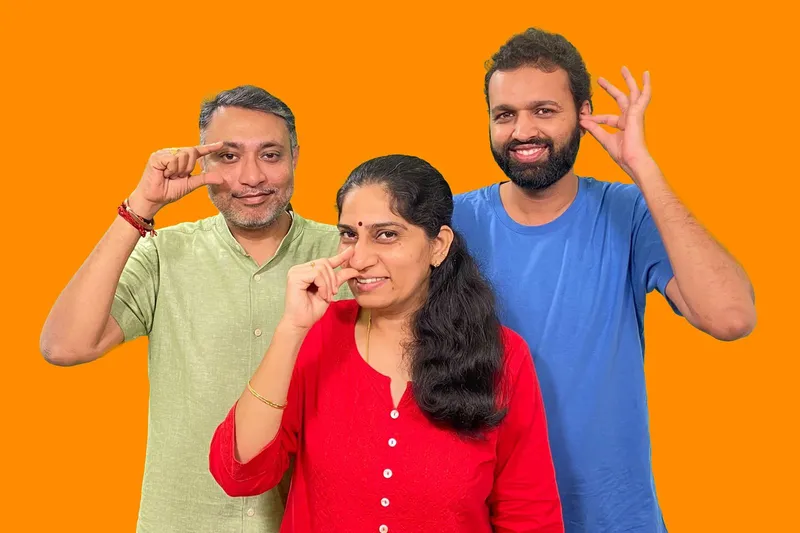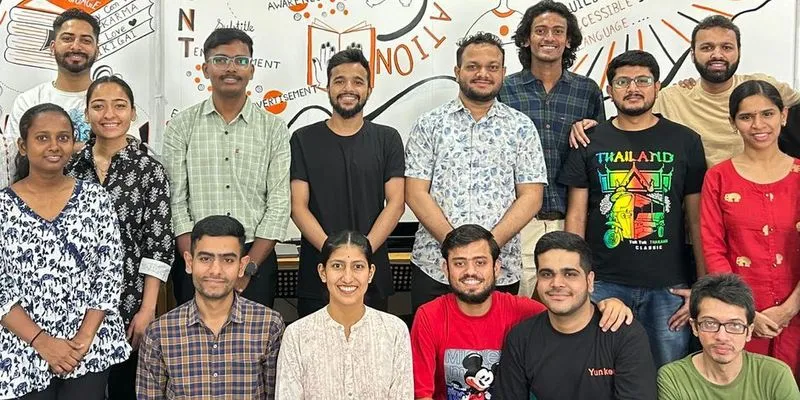This organisation is making education accessible to the deaf community
Yunikee runs a programme called Sign Medium which offers skill-building courses like stock trading, yoga basics, English, photography and more in sign language.
Vijay Naik—a deaf person—had a passion for the stock exchange. However, he never got access to any course that was available in the Indian sign language.
His search finally ended when one of his friends told him about Yunikee, a Hyderabad-based organisation which helps people with hearing disabilities in India. The organisation offered a course on the subject and Naik was quick to take it up.
“I understand the concepts better and have much more confidence in how I trade,” he tells SocialStory, continuing, “Deaf people often lack access to the necessary information and skills, but Yunikee is bridging that gap, making it easier for us to learn and succeed.”
Founded by Nita Gopalakrishnan, her husband Chaithanya Kothapalli, and Rahul Jain, the organisation began its journey in 2020.
It runs a programme called Sign Medium which offers skill-building courses like stock trading, yoga basics, English, photography and more.
Kothapalli explains that the word ‘Yunikee’ means that ‘I exist’ in Telugu. The word implies that deaf people cannot be identified until one speaks to them, however, they do coexist.
“The goal is to empower the deaf community by providing access to all products and services in Indian Sign Language. Additionally, by offering skill development and educational courses, the organisation aims to make the community independent and offer them a chance for a brighter future,” he adds.
The realisation

Chaithanya Kothapalli (left), Nita Gopalakrishnan (centre), Rahul Jain (right)
For Gopalakrishnan, Indian Sign Language was the first language she learned, as both her parents were deaf. Similarly, Jain, who is also deaf, was raised by deaf parents.
Gopalakrishnan shares that being closely connected with sign language from a young age greatly influenced her career choices. She went on to become a special educator, travelling to rural areas to teach parents and teachers how to communicate and educate using sign language.
Jain, on the other hand, was working as a Senior Lead Trainer with an organisation called Deaf Child Worldwide, where Gopalakrishnan was also a consultant. It was during this time that Jain and Gopalakrishnan met each other.
Kothapalli had a long corporate career in training and development roles, but through his wife’s work and interactions with his in-laws, he gained a deeper understanding of the deaf community. After nearly 20 years in the corporate world, he also decided to quit his job in 2020 to join Gopalakrishnan and Jain in starting this social impact platform.
As COVID-19 hit in 2020 and everything went online, the deaf community was largely left without access to educational or entertainment material.
During this time, the trio were asked to translate a Java programming course into sign language, which made them realise the significant gap in educational resources for the deaf community.
This realisation led them to start Yunikee in 2020 with a stock trading course that attracted 75 to 100 students.
From there, there was no looking back for the trio.
“Deaf people are as capable as anyone, but the lack of access needs to be addressed,” Gopalakrishnan says.
Kothapalli explains that while Indian Sign Language (ISL) is generally similar across India, there may be regional differences.
He emphasises that ISL is entirely independent of spoken languages. It has its unique structure and is not a representation of Hindi, English, or any other spoken language in India.
Additionally, a report by the National Institute of Open Schooling clarifies that the ISL uses fingerspelling but only to quote words from the written language. It does not mean that ISL is based on another spoken or written language.
Kothapalli further adds that the Indian Sign Language Research and Training Centre (ISLRTC) is the leading organisation responsible for curating a dictionary of 10,000 words. They regularly update it with new words and signs, which can be accessed through their website. He mentioned that they are collaborating with ISLRTC to add another 10,000 words to the dictionary.
Talking of challenges, he explains that from a business perspective, not many companies are interested in making their products or services accessible to the deaf community.
“We sometimes have to educate the clients and make them understand the business benefit of doing so,” he adds.
Building futures

The platform also offers over 70 courses
Yunikee started an online learning platform which was eventually made into a marketplace for different courses.
Kothapalli explains that experts in different fields can register and add their course material to the platform. The material is however checked for its content and the sign language used, by their team which majorly consists of people from the deaf community. These tutors may or may not be from the deaf community.
They get a payment of 30% to 70% of the revenue generated from their course.
Sindhu, one of the deaf tutors at Yunikee, learned about the platform through a friend. She teaches 2D animation to earn additional income and helps other deaf individuals acquire valuable skills, earning around Rs 30,000 a month.
“Yunikee is better. Other platforms use difficult English, but here, teaching in sign language makes it easy for students to learn and understand. Now, I earn a decent income from this work,” she shares.
Kothapalli also adds that the courses are offered at a subsided rate.
“Let’s say a course for stock trading might cost Rs 30-40,000 a year but we provide it for Rs 5-7,000,” he says.
The platform also offers over 70 courses including English, Banking, Indian Sign Language and blouse design. They have had around 1,000 subscribers so far.
“We engage with the community through our social media channels to understand what they want to learn. With 80 per cent of our workforce being deaf, it helps us better understand and meet the community’s needs,” he adds.
Recently the organisation also partnered with the ISLRTC and will design 23 sign language courses that will be available for free. These will include–Python, Jeera, UI and UX design, creative arts and more.
“Although many steps are being taken to make education accessible to the deaf community there is still a long road ahead,” Kothapalli says.
Edited by Affirunisa Kankudti







